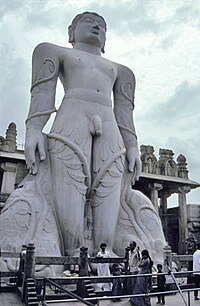
Back Djainisme Afrikaans Jainismus ALS Chainismo AN जैन धर्म ANP الجاينية Arabic جاينيه ARZ জৈন ধৰ্ম Assamese Xainismu AST Caynizm Azerbaijani جاینیزم AZB

Iainismus[1] sive Gennismus[2] est antiqua religio Indica, quae viam praescribit non violentam erga omnes res quae vivunt. Sua philosophia et facinora vehementius dicunt postulationem ut homines animam ad sensum divinum et liberationem promovere conentur. Quaevis anima quae suos inimicos interiores vicit et statum entitatis supremae adsecuta est jina 'victor' appellatur, nam Iainismus est via ad hoc statum adsequendum.
Iainismus a scripturis antiquis Shraman Dharma 'dharma fidem sibi habens' vel religio Nirganthae (cui non sunt studia et odia) appellatur. Praeterea, Iainismus plerumque Jain Dharma (जैन धर्म) in lingua Sanscritica et Samanam in lingua Tamil appellatur.
Iainismus, quem adsectatores semper exsistisse credunt,[3][4][5] ab historicis inter saecula nonum et sextum a.C.n. ortum fuisse habetur.[6][7][8][9][10] Iainismus est ad vitam revocatus a stirpe viginti quattuor asceticorum (hominum doctorum qui cibo et aliis rebus quotidianis abstinuerunt) appellatorum tirthankararum (Buswell 2004:391), quorum praecipui nobis certi sciti fuerunt Parsva saeculo nono a.C.n. et Mahavira saeculo sexto a.C.n.: "Est argumentum mores Iainos fuisse iam veterrimos quam mores Buddhisticos, fortasse retro ad tempus civilizationis Vallis Indae, et Vardhamanam—non "conditorem" per se—fuisse potius tantum principalem morum magnopere vetustiorum vicarium."[11][12][13][14][15] Nonnulli quaesiverunt num religio prioribus temporibus orta sit, quae "spiritualitatem" vernacularem ante migrationem Indo-Aryanam in Indiam ostendit.[16][17][18]
Iainismus hodie est parva sed gravissima "minoritas" religiosa, quae ad 4 200 000 adsectatorum in India habet,[19] cum communitatibus advenarum in America Septentrionali, Europa Occidentali, Asia Orientali, Australia, et alibi.[20]
Nexus interni
- ↑
 Fons nominis Latini desideratur (addito fonte, hanc formulam remove)
Fons nominis Latini desideratur (addito fonte, hanc formulam remove)
- ↑ Confer Hesychius γ364: "Γεννοί· οἱ Γυμνοσοφισταί" et Disputatio:Infinitas#Jaina.
- ↑ "Jainas consider that religion is eternal and imperishable. It is without beginning and it will never cease to exist. The darkness of error enveloping the truth in certain, periodically occurring aeons clears up again and again so that the brightness of the Jaina-faith can sparkle again anew" (Glasenapp et Shrotri 1999:15).
- ↑ "Jainism is believed by its followers to be everlasting, without beginning or end" (Dundas 2002:12).
- ↑ "The Historians have so far fully recognized the truth that Tirthankara Mahavira was not the founder of the religion. He was preceded by many tirthankaras. He merely reiterated and rejuvenated that religion. It is correct that history has not been able to trace the origin of the Jaina religion; but historical evidence now available and the result of dispassionate researches in literature have established that Jainism is undoubtably an ancient religion" (Varni 1993:xii–xiii).
- ↑ "Thus not only nothing, from the philosophical and the historical point of view, comes in the way of the supposition that Jainism was established by Parsva around 800 BC, but it is rather confirmed in everything that we know of the spiritual life of that period" (Glasenapp et Shrotri 1999:24).
- ↑ "Jainism, then, was in origin merely one component of a north Indian ascetic culture which flourished in the Ganges basin from around the eighth or seventh centuries BCE" (Dundas 2002:17).
- ↑ "It (Jainism) arose in the sixth century B.C.E. in protest against the ritualism of Hinduism and the authority of the Vedas" (Edwards 2001).
- ↑ "Jainism arose in the 6th century BC as a reaction against the caste restraints and rituals of Hinduism" (Singh 2005:62).
- ↑ "Jainism is a religion that was established about the same time as Buddhism and developed parallel to it" (Nakamura 1990:266).
- ↑ Gerald James Larson, India’s Agony over Religion (SUNY Press, 1995, ISBN 0-7914-2412-X), p. 27.
- ↑ "The Historians have so far fully recognized the truth that Tirthankara Mahavira was not the founder of the religion. He was preceded by many tirthankaras. He merely reiterated and rejuvenated that religion. It is correct that history has not been able to trace the origin of the Jaina religion; but historical evidence now available and the result of dispassionate researches in literature have established that Jainism is undoubtly an ancient religion" (Varni 1993:xii–xiii).
- ↑ "One significant difference between Mahavira and Buddha is that Mahavira was not a founder of a new movement, but rather a reformer of the teachings of his predecessor, Parsva" (Craig 1998:33).
- ↑ "Originating on the Indian sub-continent, Jainism is one of the oldest religion of its homeland and indeed the world, having pre-historic origins before 3000 BCE and the propagation of Indo-Aryan culture" (Beversluis 2000:81).
- ↑ Guseva p. 44.
- ↑ Gerald James Larson, India’s Agony over Religion (1995, SUNY Press, ISBN 0-7914-2412-X) ait: "There is some evidence that Jain traditions may be even older than the Buddhist traditions, possibly going back to the time of the Indus valley civilization, and that Vardhamana rather than being a “founder” per se was, rather, simply a primary spokesman for much older tradition" (p. 27).
- ↑ Joel Diederik Beversluis in Sourcebook of the World's Religions: An Interfaith Guide to Religion and Spirituality (Novato, Calif.: New World Library, 2000, ISBN 1-57731-121-3) ait: "Originating on the Indian sub-continent, Jainism is one of the oldest religion of its homeland and indeed the world, having pre-historic origins before 3000 BC and the propagation of Indo-Aryan culture" (p. 81).
- ↑ Guseva, p. 44.
- ↑ Indian Census.
- ↑ Aestimationes numeri Iaini a quattuor milliones ad duodecim milliones variant.